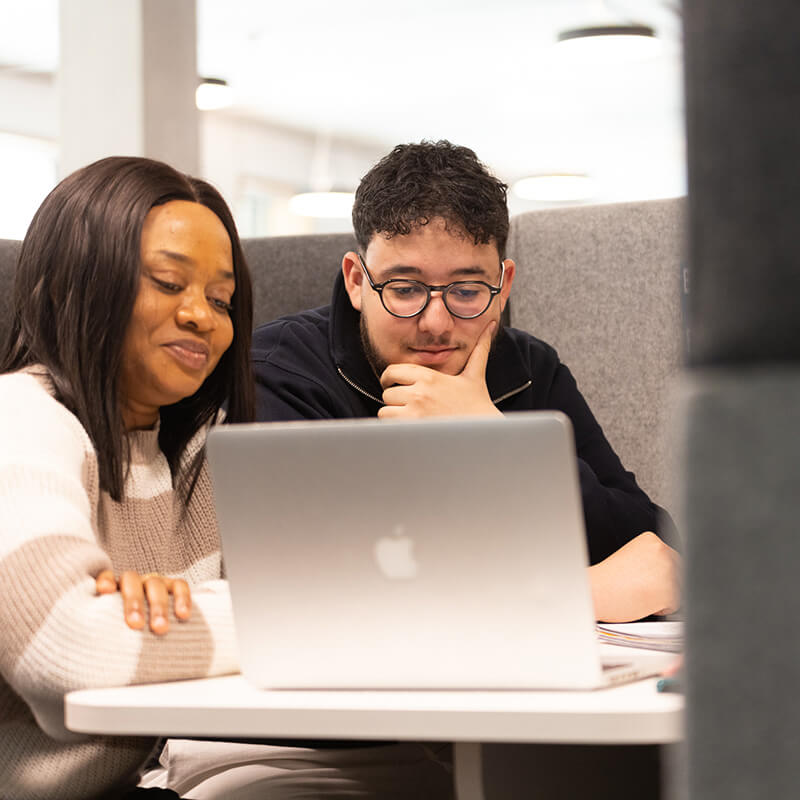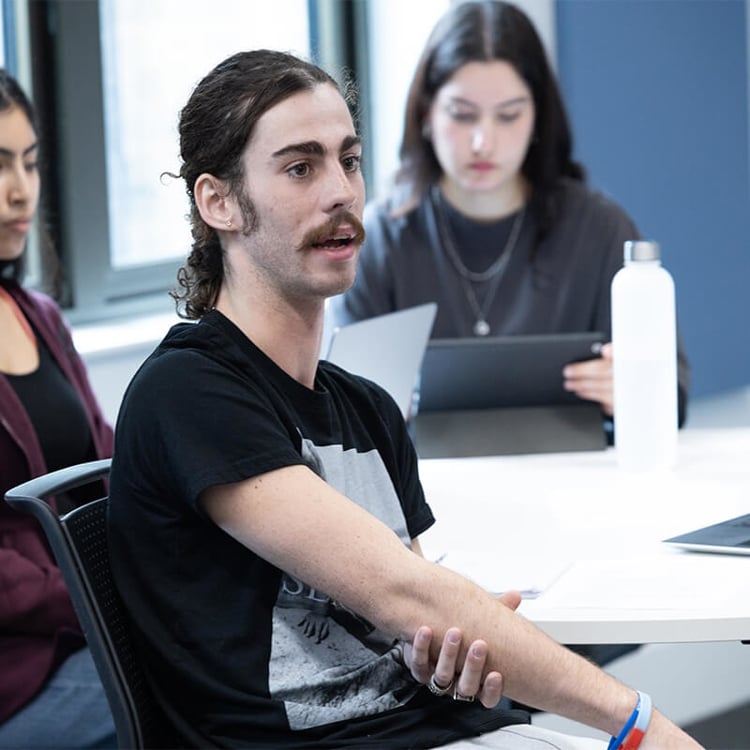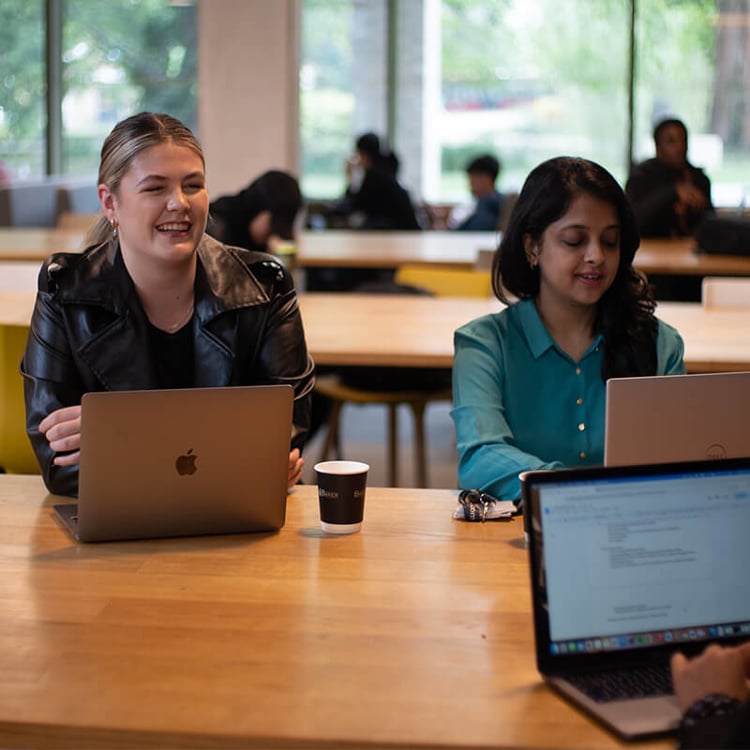Entry tariff:
112–128 UCAS points (or equivalent)
UCAS Code:
G5N1
Start date(s):
September 2027
Bridge technology and strategic management through hands-on automation, data analytics, and innovation practices. Develop entrepreneurial thinking and ethical decision-making skills to thrive in today’s fast-changing digital landscape.
Choose Roehampton and:
- Graduate with technical automation and strategic management skills.
- Develop technical competency and essential professional skills through integrated project-based learning.
- Build a comprehensive portfolio that demonstrates your skills to employers.
Business Studies ranked top 10 in UK for Learning Opportunities, Assessment and Feedback and Student Voice
National Student Survey 2024

Our BSc Computing and Business programme prepares you for a wide range of careers in the business, technology and commercial sectors.
You’ll develop the technical and strategic skills needed to create impactful digital solutions, solve complex business challenges, and lead innovation in fast-paced, ever-evolving environments. Through a curriculum aligned with industry needs, you’ll gain hands-on experience in designing, developing, and managing systems that drive success.
- Learn core computing and business technology skills, including software development, database management, business systems integration, and digital transformation fundamentals.
- Learn to use industry tools and software, such as enterprise software platforms, business intelligence tools, customer relationship management systems, and project management software.
- Approach business challenges systematically, through technology solutions.
- Develop your analytical thinking through process optimisation and strategic planning.
- Evaluate commercial opportunities and understand stakeholder requirements across different types of organisations.
- Get hands-on experience in requirements gathering and system specification, alongside a range of digital transformation techniques, preparing you to create functional solutions for commercial applications.
- Make data-driven decisions with commercial datasets, by understanding business analytics, data science applications, and performance visualisation.
- Present strategic insights.
- Work on collaborative business projects, and gain and understanding of strategic planning and stakeholder management.
- Build a mindset of self-development, so you stay ahead of trends and technologies throughout your career.
- Learn the practicalities of project management, including planning, managing resources and understanding commercial risks.
Modules
30 credits
This module introduces Computer Science as a professional and academic discipline. You will learn the fundamentals of computer systems and networks and gain practical skills that will be essential for your future in academia and industry.
You will develop and apply your knowledge and skills through a series of practical 'challenges'. Through guided activities, you will be able to recognise and understand the building blocks of the computer-based systems that are prevalent today. Practical skills are complemented by industry case studies through which you will identify and analyse the social, legal, ethical, and environmental impact of computing.
You will have the opportunity to develop your skills and knowledge through activities including:
- Using the command line interface.
- Installing an open-source operating system.
- Creating wired and wireless Local Area Networks (LANs).
- Troubleshooting connected devices, including camera and sound modules.
- Identifying and understanding the fundamental components of a computer (e.g., RAM, CPU, storage).
- Undertaking performance measurement and benchmarking.
- Developing your awareness of cyber security and the foundations of computer systems, including logic and assembly languages.
You will also investigate industry case studies, through which you will gain a breadth of understanding of the place of computer-based systems in industry and society and how professionals can influence issues such as environmental sustainability, equality and diversity, and the global economy.
Teaching and learning
The module is delivered via various activities that you will undertake in small groups in a carousel format. You will be able to prepare in advance for each activity, which will be supported by step-by-step instructions and background content in the form of videos and presentations.
Lecturers and lab demonstrators will help you in class.
Assessment
This module will be assessed by a knowledge-based in-class test (40%) and a journal/reflection, either written or audio/visual presentation (60%).
Learn how money works in business and use data to make financial decisions. You'll study budgeting, company finances, and use spreadsheets and analytics tools to identify trends, solve problems, and help businesses through data analysis.
30 credits
This module introduces you to foundational tools and processes required to develop software applications aimed at specific users. You will cover the basics of designing user interfaces, creating web pages, understanding databases, and linking 'frontend' and 'backend' code.
You will have the opportunity to apply your knowledge from software development to real-world problems and consider the needs of users and stakeholders.
There is a strong focus on databases, including database modelling and design. You will also further develop your programming skills and knowledge of industry best practices, including containerisation, version control, debugging, testing, and coding standards.
By the end of this module, you will have built your own fully functional, user-tested web application from scratch, integrating a database and secure backend logic.
Teaching and learning
The module is delivered via a series of practical lab sessions based on weekly tasks and supported by screencasts and online coding resources that develop your skills and knowledge.
The module employs a project-based approach to build the foundational knowledge and practical skills students need. This structure ensures you not only understand the general importance of the material but also gain hands-on experience applying core concepts.
Assessment
This module will be assessed by coursework (40%) and web application (60%).
Study how people behave at work. Explore team dynamics, employee motivation, leadership approaches, and workplace cultures. You'll learn evidence-based strategies to manage people, handle organisational change, and understand different work environments.
These are the current planned modules on this course and may be subject to change.
This module teaches you how to plan, organise and deliver projects successfully from start to finish. You'll learn essential skills like setting goals, managing timelines, working with teams, and solving problems when things go wrong. Perfect preparation for university projects, work placements, and future career success in any field.
This module teaches you to identify business opportunities and develop leadership skills. You'll learn to spot market gaps, understand customer needs, and build the capabilities needed to lead teams effectively. Suitable for students interested in entrepreneurship and developing the skills required to start and manage business ventures.
Learn practical business automations skills to automate everyday business tasks like data processing, report generation, and workflow management. This module covers essential automation concepts using beginner-friendly techniques, AI and ot5her tools, helping you understand how technology can streamline operations and solve real workplace challenges. No prior programming experience required.
In this module you will learn key concepts such as customer journey mapping, service blueprinting, touchpoint design, and stakeholder experience optimisation. Through hands-on workshops, you'll design and prototype services, utilise design thinking methodologies, and understand how organisations create seamless experiences that integrate front-end customer interactions with back-end operational processes in real-world business environments.
These are the current planned modules on this course and may be subject to change.
This course offers all students the option of a one-year paid work placement, to boost your employability even further. If you choose this route, you will take the placement following year two of your course, and then return to complete your degree.
Why take a placement?
A placement year is the perfect opportunity to gain valuable work experience, to build on the career skills we will teach you on this degree. The connections you make on the placement will improve your career prospects further, and equip you with the skills you need to secure graduate-level employment.
How we support you
The University's Placement and Work Experience Team are experts at helping you to secure a placement. They will work closely with you from the start, helping you research potential employers, discover placement opportunities, create and pitch your CV, and will coach you to perform well in interviews. We aren't able to guarantee a placement, but our sector-leading advisors will give you the best possible chance of securing one.
Find out more about how we'll support you
We understand that your plans might change once you start your programme. If you decide not to do a placement, you will have the option of completing the three year version of your programme.
Whatever your choice, you will have access to many opportunities for work experience through our Placement and Work Experience Team, and access to face-to-face and 24/7 online careers support.
This module teaches you how to turn boring numbers into cool charts, graphs, and interactive visuals. You'll learn design principles, build web-based visualisations, and discover how people's brains process visual information. This combines everything from previous data modules, helping you present findings for businesses, journalism, or science in engaging ways.
This module explores how businesses can operate fairly and responsibly in society. You'll examine real-world ethical dilemmas, learn about corporate social responsibility, and understand how managers make decisions that balance profit with environmental and social concerns. Develop critical thinking skills to evaluate business practices and their impact on stakeholders.
This module explores how organisations develop and implement new ideas, products, and services. You'll learn about the innovation process, from initial concepts to market launch, and examine how companies manage creative teams and overcome challenges. The course covers real-world case studies and practical tools for fostering innovation in different business contexts.
30 credits
The Capstone Project provides you with the essential opportunity to deeply explore a subject of high personal interest, situated within the context of your overall programme of study.
You are expected to apply and synthesise your professional practice and research capabilities throughout this project. By bringing these skills together, you will conduct a substantial investigation that extends and demonstrates your practical and academic knowledge. Upon completion, you will produce a significant technical artifact alongside a detailed report.
Building on the Professional Practice in Technology module, you will be able to critically engage with current literature and established research methodologies. Using the knowledge and feedback gained from this module, you will be equipped to develop your research question or problem statement. This work will lead you to systematically evaluate relevant sources, creating a strong foundation for your investigation.
Implementing knowledge gained from the earlier module will enable you to strengthen your methodological approach and demonstrate advanced research and problem-solving skills in your capstone project. You will be able to design and implement an evidence-based solution that addresses your research question and stated objectives. The project culminates in a critical evaluation and reflection on the impact of your solution in relation to your original research goals.
You will be assigned a named individual supervisor who will provide expert guidance throughout your project. While your supervisor is key, you are strongly encouraged to access the full range of academic and research support systems available across the university to enhance your work.
Collaboration is often a feature of the Capstone Project: you may either work with external stakeholders who provide a real-world project brief, or you may have the chance to work alongside an academic, contributing directly to their ongoing research. This project is not undertaken in isolation; peer support is fundamental, and your Capstone Project is developed within a strong, supportive learning community of both staff and fellow students.
Teaching and learning
The module is delivered via three modes of study:
- On-campus sessions that help you conform to the necessary timeline and project requirements
- One-to-one feedback from a named supervisor
- Independent study
The on-campus sessions provide practical activities which directly contribute to the students’ project deliverables.
Peer support via on-campus session activities and group supervisory meetings is strongly encouraged and rewarded via digital badges in Moodle.
Assessment
This module will be assessed by a feedback-feedforward and Q&A session (30%) and a report and artefact (70%).
These are the current planned modules on this course and may be subject to change.
Career
As a graduate of BSc Computing and Business, you'll be prepared to go into exciting professional roles and build the career you want.
With your understanding of technology and business strategy, your potential roles could include:
- Business analyst
- Systems analyst
- Digital project manager
- IT consultant,
- Product manager
- Data analyst
- Business intelligence specialist
- Digital transformation coordinator
- Technology relationship manager.


The Student Futures team is here to support you throughout your time at Roehampton and beyond.
They offer services tailored to your needs, helping you take confident steps towards your future.
You’ll have access to a wide range of career workshops and events, where you can engage with employers and develop the skills you need to succeed in the workplace.
These opportunities will help you build your CV, prepare for interviews, and connect with successful Roehampton graduates who are thriving in their careers. You’ll also be able to engage with our partners across London and beyond.
Wherever you want to go in the future, you'll be preparing for the world of work from your very first day.
Learning and Assessment
You won’t spend your days sitting in a lecture theatre at Roehampton. You’ll be putting your learning into practice, tackling technology challenges, all with the support of your dedicated lecturers.
You’ll be taught by subject specialists and industry professionals who bring real-world experience and cutting-edge research directly into your learning. This means you’ll gain more than just academic knowledge - you’ll develop the practical skills and critical thinking needed to thrive in your career.
How you’ll learn
Your classes will mirror the fast-paced, collaborative nature of the tech-driven business world.
You’ll work both independently and in teams to solve different briefs, to build your professional experience.
This includes:
- Hands-on workshops
- Collaborative, project-based learning where you’ll work in teams to solve real problems
- Practical tasks and projects, so you can build your skills
- Personalised lab support, with guidance from our teaching teams so you master key tools and techniques
- Using industry-standard tools, so you’re ready to hit the ground running when you graduate
- Access to videos, online learning and quizzes in advance, so you can learn at your own pace.

How you’ll be assessed
Your assessments will develop your technical abilities, critical thinking, and professional communication skills.
This includes:
- Practical assignments – solve problems under real-world conditions, to build your skills in critical thinking and decision making
- Lab-based coursework – apply what you’ve learned in class
- Reports and analysis – investigate issues and report your findings, to develop your ability to analyse data, evaluate risks, and present professional-level documentation
- Real-world scenario tasks – solve practical problems that reflect industry
- Gamified assessments – interactive challenges to test your problem-solving skills
- Project-based assignments – learn to design and deliver real solutions – culminating in your final-year capstone project – to showcase your technical skills, creativity, and readiness for the job market.

Cutting-edge facilities in the Sir David Bell building
We offer six dedicated computing labs on campus, each equipped with specialised facilities, including a dedicated cyber security lab.
All the software necessary for your studies is freely available, allowing you to work conveniently from anywhere and at any time using your personal device.
Open days
Get a real taste of our campus, community and what it’s like to study at Roehampton
Applying
Full-time UK undergraduate students apply through UCAS.
Course subject to curriculum enhancement and revalidation.
Entry tariff
112–128 UCAS points (or equivalent)
Looking to work out your UCAS points or find out about our entry requirements? Find out more.
When we consider applications to study with us, we form a complete view of your achievements to date, and future potential, and can offer flexibility in entry requirements. Find out more about our Contextual Offer scheme.
General entry requirements
September 2025 entry tuition fees
UK (home) tuition fees
Undergraduate degree: £9,535
We offer a wide range of scholarships and bursaries. See our financial support pages for UK students.
We also provide other ways to support the cost of living, including on-campus car parking, hardship support and some of the most affordable student accommodation and catering in London. Find out more about how we can support you.
International undergraduate students apply through our direct application system.
Course subject to curriculum enhancement and revalidation.
Entry tariff
112–128 UCAS points (or equivalent)
Looking to work out your UCAS points or find out about our entry requirements? Find out more.
When we consider applications to study with us, we form a complete view of your achievements to date, and future potential, and can offer flexibility in entry requirements. Find out more about our Contextual Offer scheme.
General entry requirements
September 2025 entry tuition fees
EU and international tuition fees
Undergraduate degree: £16,950
We offer a wide range of scholarships and bursaries. See our financial support pages for international students.
We also provide other ways to support the cost of living, including on-campus car parking, hardship support and some of the most affordable student accommodation and catering in London. Find out more about how we can support you.






